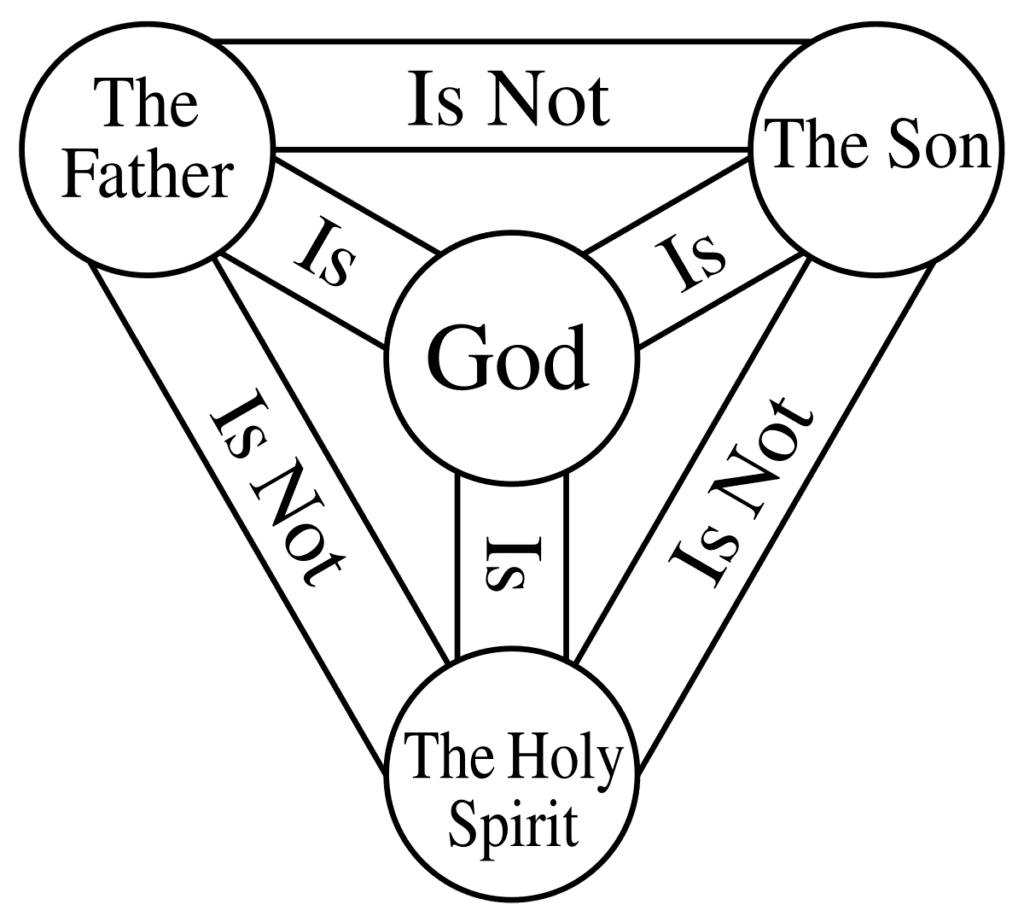The doctrine of the Trinity is one of the most intricate aspects of God, partly because it’s not directly referenced in the Bible. There isn’t a section where Paul, for example, says, “Our God is a triune entity. This is how that’s depicted, and this is the significance for us.” Bringing to mind His self-existence, it’s a complex concept that can make your brain twirl.
It’s a doctrine that was created by man to help put words and thought to three-in-one nature of God that’s clear from start to finish in the Bible. It’s one of God’s core attributes.
So, is the Trinity in the Bible? Yes, from the first page of Genesis to the last page of Revelation, we see the triune nature of our God in Father, Son, and Holy Spirit. But the word Trinity is not used anywhere in the scriptures.
Let’s take a look at what orthodox Christians believe about the Trinity, where we see the doctrine in the scriptures, and what the Trinity means for us.
What is the Trinity?
The Holy Trinity describes the unity of Father, Son, and Holy Spirit as three persons in one Godhead. All three are God and God is all three.
Head hurt? Though hints of the doctrine of the Trinity can be seen in creation, you don’t know anyone else whose being is three-in-one. It’s foreign to us as human beings. So whether you’re just learning about the Holy Trinity for the first time or you’ve been wrestling with it for years – don’t expect God’s nature to simply click with you. He is simple, yet incomprehensible. Our minds can’t fathom His greatness.
The Trinity is made up of:
- God the Father, who we see as Father, Lord, Judge, and Creator
- Jesus the Son, who we see as God incarnate, Savior, and Coming King
- The Holy Spirit, who we see as Helper and Comforter, dwelling in us as a deposit of salvation
You might also like: What Does it Mean to Grieve or Blaspheme the Holy Spirit?
All three are God, yet all three are unique.

God the Father in the Bible
Where do we see God the Father in the Bible, unique from the rest of the triune Godhead (this is not an exhaustive list):
- In the beginning, God created the heavens and the earth. (Genesis 1:3)
- “You are the Lord, you alone. You have made heaven, the heaven of heavens, with all their host, the earth and all that is on it, the seas and all that is in them; and you preserve all of them; and the host of heaven worships you.” (Nehemiah 9:6)
- For his invisible attributes, namely, his eternal power and divine nature, have been clearly perceived, ever since the creation of the world, in the things that have been made. So they are without excuse. (Romans 1:20)
- One God and Father of all, who is over all and through all and in all. (Ephesians 4:6)
- But now, O Lord, you are our Father; we are the clay, and you are our potter; we are all the work of your hand. (Isaiah 64:8)
- Look at the birds of the air: they neither sow nor reap nor gather into barns, and yet your heavenly Father feeds them. Are you not of more value than they? (Matthew 6:26)
Our God is a good Father, Lord of all, Creator of all, and worthy of all praise.
Jesus the Son in the Bible
Where do we see God as the man Jesus Christ in the Bible (again, not an exhaustive list, just a snapshot):
- For God was pleased to have all his fullness dwell in him (Colossians 1:19)
- And we know that the Son of God has come and has given us understanding, so that we may know him who is true; and we are in him who is true, in his Son Jesus Christ. He is the true God and eternal life. (1 John 5:20)
- Jesus said to him, “I am the way, and the truth, and the life. No one comes to the Father except through me. (John 14:6)
- He is the radiance of the glory of God and the exact imprint of his nature, and he upholds the universe by the word of his power. After making purification for sins, he sat down at the right hand of the Majesty on high… (Hebrews 1:3)
- “I and the Father are one.” (John 10:30)
- He is the image of the invisible God (Colossians 1)
Jesus claimed to be the Son of God as He walked the earth and ushered in the Kingdom of God. But more than that, He claimed to be God Himself – one of the biggest reasons He was put on trial.
The Holy Spirit in the Bible
Where do we see God as Holy Spirit in the Bible?
- Now the Lord is the Spirit, and where the Spirit of the Lord is, there is freedom. (2 Corinthians 3:17)
- And I will give you a new heart, and a new spirit I will put within you. And I will remove the heart of stone from your flesh and give you a heart of flesh. And I will put my Spirit within you, and cause you to walk in my statutes and be careful to obey my rules. (Ezekiel 36:26-27)
- But when the Helper comes, whom I will send to you from the Father, the Spirit of truth, who proceeds from the Father, he will bear witness about me. (John 15:26)
Pictures of the Trinity in Scripture
There are a handful of places in the Bible that speak to all three aspects of the triune God in unison.
The Trinity in the Creation Account
One of those is in creation. We see God say, “Let us” create man in our image. It might not have been immediately clear who He was speaking to, but we see in Colossians that all things were created in and through Jesus (Colossians 1) and more clearly in John says that Jesus was present since the beginning,
In the beginning was the Word, and the Word was with God, and the Word was God. He was with God in the beginning. Through him all things were made; without him nothing was made that has been made.
John 1:1-3
In the creation story, we see God the Father, Jesus (the Word) present, and the Spirit of God hovering over the waters. All three present from the beginning.
The Trinity in Baptism
In Acts, when the apostles are giving instruction for baptism, they’re sure to include all aspects of the Godhead when declaring someone new, as Jesus taught them:
“Go therefore and make disciples of all nations, baptizing them in the name of the Father and of the Son and of the Holy Spirit.”
(Matthew 28:19)
The Father, Son, and Holy Spirit are all highlighted because they all play a role in salvation and life with God. We are reconciled to God the Father, thanks to the cross carried by Jesus He would die on, by the power of the Holy Spirit. Post-salvation, we commune with the triune God through the intercession of Jesus, and with the help of the Holy Spirit, who teaches us to pray and guides us into all truth.
The Doctrine of the Trinity in the Early Church
How did we come to believe the doctrine of the Trinity? Though there’s ample evidence in the Bible, it wouldn’t be immediately clear to a first time reader.
The doctrine developed gradually over several centuries and through many controversies. Early on, many Christians saw Christ as a subordinate being, not quite equal with God. There was a lot of debate over whether God and Jesus were the same person. Others saw Father, Son, and Holy Spirit as three unique manifestations of God, but didn’t believe He was all three and all three were Him simultaneously.
In response to all the controversy around the Trinity (and a few other disagreements among church leaders), the Council of Nicea met in the fourth century to sort through it all. There they stamped the church’s belief in the Trinity:
The Council of Nicaea in 325 stated the crucial formula for that doctrine in its confession that the Son is “of the same substance [homoousios] as the Father,” even though it said very little about the Holy Spirit. Over the next half century, St. Athanasius defended and refined the Nicene formula, and, by the end of the 4th century, under the leadership of St. Basil of Caesarea, St. Gregory of Nyssa, and St. Gregory of Nazianzus (the Cappadocian Fathers), the doctrine of the Trinity took substantially the form it has maintained ever since. It is accepted in all of the historic confessions of Christianity, even though the impact of the Enlightenment decreased its importance in some traditions.
Brittanica





